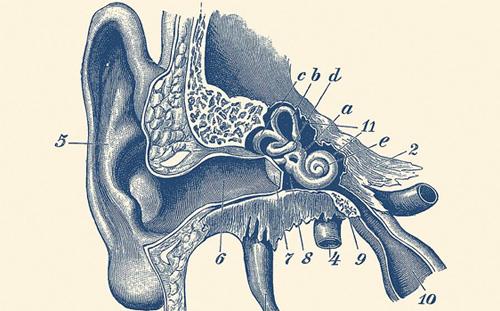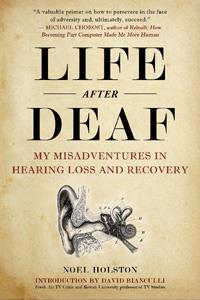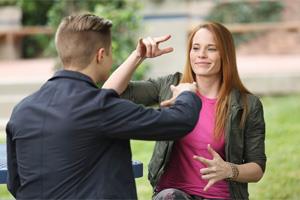
[EDITOR'S NOTE: TVWW contributor Noel Holston is the author of Life After Deaf: My Misadventures in Hearing Loss and Recovery, a memoir to be published Nov. 5 by Skyhorse.]
Browsing a website called alldeaf.com recently, I noticed someone had posted a request, asking other visitors to suggest movies with deaf or hearing-impaired characters.
"I know Children of a Lesser God and Mr. Holland's Opus, and one or two others," said a woman named Holly. "Anybody else got some names of movies with deaf people or about deaf culture?"
 What with my being a) hearing impaired and b) a veteran of the tele-criticism trenches, my first thought was that TV actually has more to offer than movies in this regard.
What with my being a) hearing impaired and b) a veteran of the tele-criticism trenches, my first thought was that TV actually has more to offer than movies in this regard.
I doubt most people realize that The Miracle Worker, William Gibson's revered and enduringly popular play about Helen Keller and her teacher, Annie Sullivan, is a TV baby. Although it was subsequently made into a Broadway hit and a celebrated theatrical with Patty Duke and Anne Bancroft, it originated on CBS's Playhouse 90 in 1957 with Patty McCormack and Teresa Wright in the leads.
The bookend for that Golden Age look at deafness would be Sundance's This Close, the first TV series helmed by deaf people and with two deaf leads.
In between come quite a few productions, including two TV remakes of The Miracle Worker, one in 1979, another in 2000.
I'll never forget Love Is Never Silent, a made-for-TV film I reviewed when it first aired in 1985. It's about a young woman (Mare Winningham) torn between going out on her own or staying with her deaf parents, who depend on her to hear for them.
Then there's:
And Your Name Is Jonah, a poignant 1979 TV drama about a child believed to be autistic but later discovered to be deaf.
Silent Victory: The Kitty O'Neil Story, a TV biopic in which Stockard Channing starred as real-life stuntwoman and racecar driver who was born deaf.
Bridge to Silence, a 1989 TV movie with Oscar winner Marlee Matlin as the deaf mother who has to fight to retain custody of her hearing child after her husband dies.
After the Silence (1996), a fact-based TV film about a social worker who teaches sign language to a deaf teenager rescued from an abusive home.
As you can see, "silence" was golden back then.
It also bears pointing out that these are artifacts of the heyday of TV movies, when inspirational stories of people coping with illness or adversity were more popular than, say, series about anxious gangsters or warring kingdoms with dragons instead of fighter jets.
In the decades since, while there have been movies dealing with deaf issues – like Sweet Nothing in My Ear (2008), in which a father (Jeff Daniels) wants to restore his son's hearing with surgery while the mom (Marlee Matlin) opposes the plan – the deaf presence has been more prevalent in weekly series.
 Freeform's Peabody Award-winning Switched at Birth (2011–2017, right) had a major character and a prominent supporting character, both played by deaf actors fluent in American Sign Language.
Freeform's Peabody Award-winning Switched at Birth (2011–2017, right) had a major character and a prominent supporting character, both played by deaf actors fluent in American Sign Language.
The West Wing (1999-2006) had a recurring character, a shrewd political consultant, played by the ubiquitous Matlin.
Picket Fences, Heroes, CSI: Crime Scene Investigation, The L Word, Jericho, and Weeds all featured deaf characters at some point.
What's missing, unless I somehow overlooked it, is a TV movie or series arc in which deafness or hearing impairment is more than a plot device or a character gimmick – i.e., a detective's quirky trait, like Kojak's shaved head or Monk's obsessive-compulsive disorder.
Movies and shows with deaf characters "often do not focus on the condition of deafness at all," wrote Miriam Nathan Learner in M/C Journal: A Journal of Media & Culture. "Rather, the characters seem to satisfy a role in the story that either furthers the plot or the audience's understanding of other hearing characters."
What I'd like to see is a TV movie or series episode that actually gives the audience a sense of what it's like to be deaf or seriously hearing impaired, that for at least some of the running time lets the audience hear – or not hear – like the protagonist.
It would be a challenge, no doubt, for a director, an actor or actress, and for sound technicians and designers. But wow, what a revelation it could be for people who hear and can scarcely imagine the alternative.